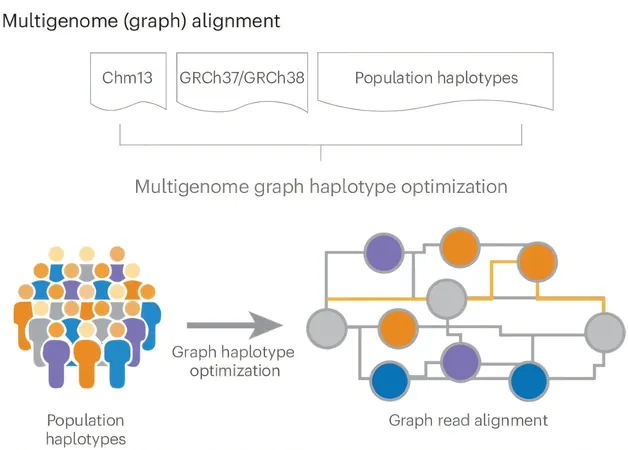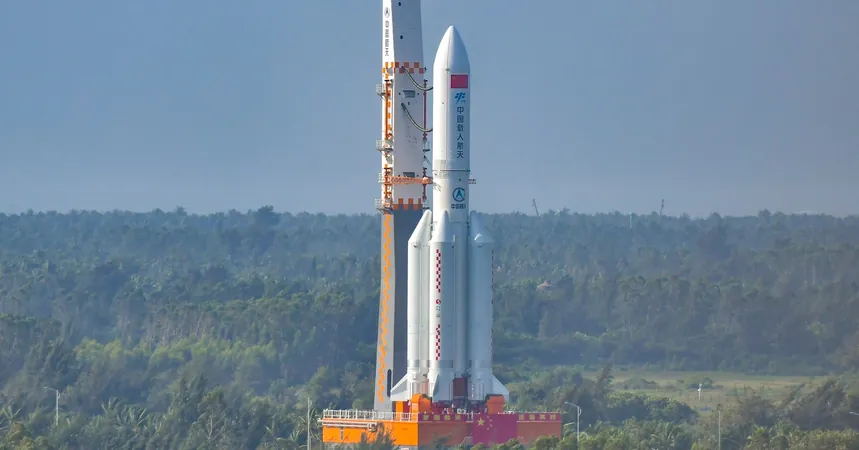
Revolutionary Genome Analysis Platform DRAGEN Unveiled: A Game-Changer for Genetic Research
2024-11-04
Author: Sarah
Introduction
In a groundbreaking study led by researchers from Baylor College of Medicine in collaboration with Illumina, the latest genome analysis platform known as DRAGEN (Dynamic Read Analysis for GENomics) has demonstrated unparalleled capabilities in genome analysis, positioning itself as a formidable force in the field of genomics.
Speed and Efficiency
DRAGEN shines in its ability to process whole-genome sequencing data at an astonishing speed, achieving 35x coverage in roughly 30 minutes. This significant stride in genomic sequencing technology represents a stark contrast to the early days of genomics, marked by the Human Genome Project which began in 1990, costing an exorbitant $2.7 billion and taking years to map a single genome. Fast forward to today—what once took years can now be accomplished in mere hours for a fraction of the cost, estimated at under $10,000, while also accommodating numerous genomes simultaneously.
Advancements in NGS
The advancements in next-generation sequencing (NGS) have not only reduced costs but have also elevated data quality and scalability, effectively removing financial barriers that once hindered genomic research. However, as the ability to generate vast amounts of data has become commonplace, the pressing challenge now lies in efficiently and accurately analyzing this data.
Challenges in Variant Detection
While current methods have made strides in detecting single-nucleotide variations (SNVs) and small insertions or deletions (indels), other variant types such as structural variations (SVs), copy number variations (CNVs), and short tandem repeats (STRs) continue to pose hurdles that require substantial post-sequencing bioinformatics efforts. Enter DRAGEN—an ingenious solution that utilizes multigenome mapping with pangenome references, hardware acceleration, and machine learning to transform raw sequencing reads into actionable data in approximately 30 minutes.
Performance Evaluation
A comprehensive performance evaluation of DRAGEN, published in Nature Biotechnology, highlighted its exceptional capacity to analyze 3,202 whole-genome datasets from the 1000 Genomes Project. The results showcased the platform’s scalability and accuracy, generating fully genotyped multisample variant call format files in record time.
Speed Assessments
Speed assessments revealed that DRAGEN could simultaneously process 3,202 human genomes at a 35x coverage, delivering results in around two hours on a dedicated Illumina Phase4 server managing 200 concurrent jobs. The system's F-measure, a critical statistical metric combining precision and recall, showcased DRAGEN's superior accuracy—especially in SNV detection—with a remarkable F-measure of 99.86%. Comparatively, other tools like DeepVariant and GATK lagged behind significantly in terms of accuracy and error rates.
Complex Analyses
Even in more complex analyses, such as identifying structural variations and copy number variations, DRAGEN outperformed competitors with F-measures of 76.90% and 92.60% respectively. Notably, its superior performance proved crucial in detecting variants in medically relevant gene regions—an aspect particularly vital for identifying genetic underpinnings of diseases.
Implications for Genomic Research
This technology’s potential implications for current and future genomic research could be transformative. Given that many genetically influenced diseases can be traced to single gene variants, the high accuracy and efficient resolution provided by DRAGEN can accelerate the discovery of new disease targets, ultimately enhancing patient treatment strategies.
Conclusion
In summary, DRAGEN signifies a monumental leap in genomic analysis capabilities. As research continues to evolve, the integration of such advanced tools will likely lead to groundbreaking discoveries in the realm of genetics, fostering innovations that have the potential to revolutionize medicine and improve patient outcomes globally. The emergent success of DRAGEN not only highlights the swift evolution of genetic technologies but also underscores the pressing need for continued investment in genomic research—a field poised to change the landscape of medicine forever.



 Brasil (PT)
Brasil (PT)
 Canada (EN)
Canada (EN)
 Chile (ES)
Chile (ES)
 España (ES)
España (ES)
 France (FR)
France (FR)
 Hong Kong (EN)
Hong Kong (EN)
 Italia (IT)
Italia (IT)
 日本 (JA)
日本 (JA)
 Magyarország (HU)
Magyarország (HU)
 Norge (NO)
Norge (NO)
 Polska (PL)
Polska (PL)
 Schweiz (DE)
Schweiz (DE)
 Singapore (EN)
Singapore (EN)
 Sverige (SV)
Sverige (SV)
 Suomi (FI)
Suomi (FI)
 Türkiye (TR)
Türkiye (TR)